Coordinación
Una coordinación sólida puede evitar vacíos y duplicaciones en las respuestas humanitarias, así como garantizar que los PTM complementen otros tipos de asistencia. Sin embargo, el informe del «Estado Global de los Programas de Transferencias Monetarias» de la CALP Network muestra que la coordinación de la asistencia en efectivo es vista como débil y ad hoc, y que esto está teniendo graves repercusiones operativas.
Los donantes, las ONG y los líderes de los grupos de trabajo de transferencias monetarias (GTM) han pedido claridad sobre tres temas principales relacionados con la coordinación de la asistencia en efectivo:
- Quién debe ser responsable de asegurar una coordinación eficaz de la asistencia en efectivo;
- Cuál es la función y el mandato de los grupos de trabajo de transferencias monetarias, incluso en relación con las transferencias monetarias multipropósito;
- Cómo se debe dotar de recursos a la coordinación de asistencia en efectivo.
Tenemos que basarnos urgentemente en lo que funciona y proporcionar claridad a nivel mundial sobre las preguntas arriba mencionadas, adaptándonos a los diferentes contextos. Hace mucho tiempo que se deberían haber tomado decisiones claras basadas en necesidades operativas y no en la política de las agencias.
Prioridades actuales
El objetivo de la CALP Network es contribuir a seguir progresando en este tema en tres niveles: apoyar a los grupos de trabajo de transferencias monetarias a nivel regional; contribuir a soluciones prácticas para la coordinación de la asistencia en efectivo a nivel mundial; y convocar una discusión basada en la evidencia sobre temas clave, destacando puntos de decisión críticos y oportunidades de progreso.
Contenido destacado

Cash Coordination Tip Sheet
Guidelines and Tools
This tip sheet sets out established best practice, key guidance and resources for all aspects of cash coordination, intended as a clear, accessible and action-oriented guide for those engaged in coordination of cash and voucher assistance (CVA) at the field level.

Introducing the Cash Coordination Tip Sheet
Webinar
The CALP Network has developed a tipsheet setting out established best practice and key guidance and resources for all aspects of cash coordination, intended as a clear, accessible and action-oriented guide for those engaged in coordination of cash and voucher assistance at the field level.

Cash Coordination: A proposal from members in MENA
Blog Post
Earlier this year the CALP Network undertook regional consultations to explore options for cash coordination. This blog lays out recommendations from participants from the Middle East and North Africa who sketched out what cash coordination, and coordination more broadly, could look like in future to support a more effective, efficient and accountable response.
Últimos recursos
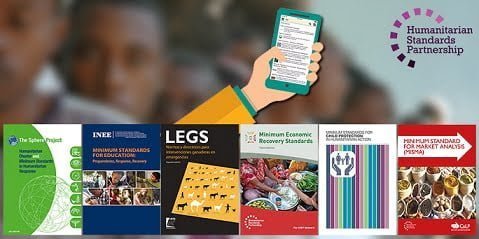
Humanitarian standards now available on mobile devices
Blog Post
The new Humanitarian Standards Partnership app (HSPapp) provides the humanitarian sector’s flagship standards and guidance in a single, free-of-charge app. Designed for field practitioners providing humanitarian aid in disaster and conflict situations, the app works on- and off-line on mobile phones and...

Harnessing Digital Technology for Cash Transfer Programming in the Ebola Response. Lessons Learned from USAID/Office of Food for Peace Partners’ West Africa Ebola Responses (2015–2016)
Report
Globally, the adoption of digital technology has grown alongside the increase in cash transfer programming (CTP), often through the use of e-transfers, in part because of the potential gains in accountability, efficiency (cost and time) and effectiveness. The 2015 High Level Panel on Cash Transfers...

Final Evaluation of the DiRECT Response Emergency Cash Transfer Programme in Zambia
Report
In the past two years (2015 and 2016), Zambia experienced relatively harsh climatic conditions characterised by disruptive rains and the negative impact of El Nino weather patterns. Districts in the southern and western regions of the country were most affected. Many farmers in the affected regions were...

How We Built a Global Action Agenda to Enable Digital Payments in Humanitarian Response
Blog Post
In recent years, digital payments have emerged as an essential, high-impact tool for humanitarian response. They can enable humanitarian responders to quickly reach people with assistance, and in ways that provide both short- and long-term benefits to those in need, such as access to safe and portable...
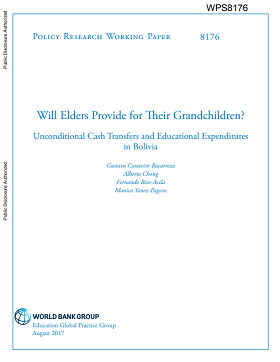
Will Elders Provide for Their Grandchildren? Unconditional Cash Transfers and Educational Expenditures in Bolivia
Report
This paper takes advantage of repeated cross-section household surveys and a sharp discontinuity created by the introduction of an unconditional cash transfers to elders.The paper evaluates the impact of these cash transfers on the educational expenditures for children within a household. The analysis...

Conflict-sensitive Cash Transfers: Unintended negative consequences
Report
Risks associated with cash transfer programmes in fragile contexts include theft, diversion, corruption, security, targeting, misuse by beneficiaries and inflationary effects. However, the literature indicates that – while different – these risks are no greater than those associated with other forms...

Libya Cash and Markets Working Group (CMWG) Advocacy and Communications Plan
Report
The Libya Cash & Markets Working Group (CMWG) Strategic Framework & 2017 Workplan outlines ‘communication and advocacy’ as a ‘deliverable’ for supporting ‘HC/HCT decision making’.
Throughout March & April 2017, the CMWG Steering Committee used a series of tools as part of a seven-step process...
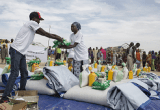
Emergency Response Programming – New Market-Analysis Skills Training Available [Eng/Fr/Arabic]
Blog Post
Market analysis is a core part of the suite of assessments that should help to inform all emergency response programming – these new courses will ensure you’re fully equipped with the knowledge you need to consider and work through local markets whenever possible.

Ethiopia Cash Working Group: Minutes of the CWG Meeting Tuesday, 25 July 2017
Report
The main purpose of the meeting would be to reach an overall
agreement on the approach taken to determine Minimum Expenditure Basket (MEB) and to take advantage of the World Bank representative to discuss PSNP and humanitarian linkages in determining both MEBs and agreed upon transfer values.

Discussion Note: Building Evidence and Developing Guidance on Operational Models for CTP
Report
This discussion note summarises the CALP Network’s proposed approach to developing guidance for donors and operational agencies to assess the suitability of different operational models for CTP, by context. The note lays out the current debate relating to different forms of collaboration for CTP, and...

Global Cash Forum
Report
This report summarises current developments in Cash Transfer Programming (CTP), as captured at the recent Global Cash Forum, held in Geneva in June 2017. In recent years, CTP has emerged as one of the most significant innovations in humanitarian response. Major donors and agencies have made public...
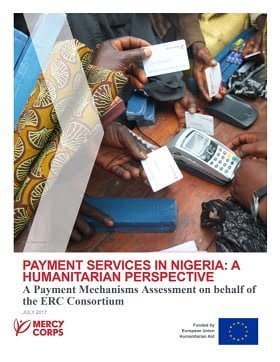
Payment Services in Nigeria: A humanitarian perspective
Guidelines and Tools
This assessment was conducted as one component of a broader inter-agency exercise to inform the use of Multi-Purpose Grants in Nigeria. As such, it examines the financial services landscape in Nigeria, in order to support the review and selection of financial service providers (FSPs) for the delivery of...

Organizational Cash Readiness Assessment: Project Concern International and Relief International Case Study
Case Study
The CALP Network partnered in 2016 with two organizations, Relief International (RI) and Project Concern International (PCI), to support them through a six-month process to strengthen their organizational readiness to deliver cash or voucher programming, using CALP’s Organizational Capacity Assessment...

Global Cash Forum
Event

Walking the talk: The Grand Bargain & Cash Transfer Programming
Blog Post
Cash Transfer Programming (CTP) is here to stay. The political battle has been won – cash is now accepted as part of the humanitarian response toolkit, and the will to increase its use is there. Now we need to bring this will to life, and turn our commitments into action.

Cash Coordination in Humanitarian Contexts
Guidelines and Tools
Cash transfer programs in humanitarian crises are on the rise. Therefore, the need for cash coordination at country level is increasing. The current setup of cash coordination is fragmented and ad hoc, leading to delays, gaps, and duplications of coordination mechanisms. The lack of clarity about...
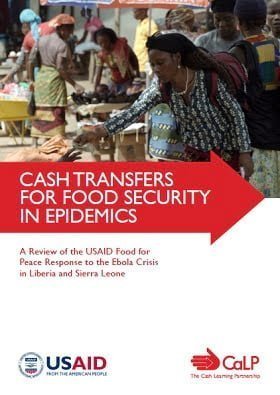
Cash Transfers for Food Security in Epidemics
Report
The report is divided into five chapters. The introduction provides a brief overview of the study’s objectives, data collection methods and a snapshot of the context in Liberia and Sierra Leone. The second chapter describes USAID/FFP’s response to the Ebola crisis with a particular focus on CTP....

Geneva-based Cash Working Group Minutes – 6th June 2017
Report
GENEVA BASED CASH WORKING GROUP MINUTES 6TH JUNE 2017
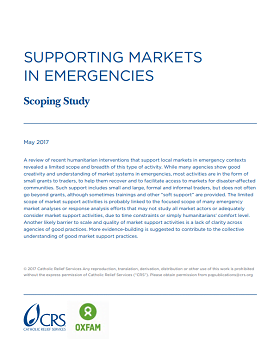
Supporting markets in emergencies. Scoping study
Report
A review of recent humanitarian interventions that support local markets in emergency contexts revealed a limited scope and breadth of this type of activity. While many agencies show good creativity and understanding of market systems in emergencies, most activities are in the form of small grants to...

Early Lessons Learnt from Cash Transfer Interventions in Post Matthew Haiti
Report
This technical report has twofold purposes, firstly to describe the main international evidence on cash transfer programing pertinent for the Haitian post Matthew emergency context; and secondly, to document the main lessons that can be learnt from the UNDP post Matthew cash transfer intervention. The...